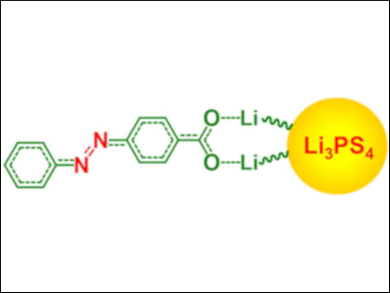Organic compounds that are lightweight, abundant, cheap to produce, and sustainable are promising electrode materials for lithium-ion batteries. However, their high solubility in liquid electrolytes limits their use in the development of high-energy batteries with long lifetimes.
Chunsheng Wang, University of Maryland, College Park, USA, and colleagues have used a Li3PS4 solid electrolyte to replace the liquid electrolyte usually required for organic batteries and, thus, solve this problem. This approach not only prevents the dissolution of the organic materials, but also enhances the safety of the resulting batteries. The team combined the Li3PS4 with an azobenzene compound containing a carboxylate group (pictured). This compound is ionically bonded via lithium ions to the Li3PS4. This ionic bonding provides a good contact between the active material and the solid electrolyte during cycling, and thus, increases the cycling stability.
The developed system has a good electrochemical performance. It delivers an initial capacity of 120 mAh g–1 at 20 mA g–1 and retains a reversible capacity of 83 mAh g–1 after 120 cycles. The high cycling stability could allow its application in smart electrical grids.
- Solid-State Electrolyte Anchored with Carboxylated Azo Compound for All-Solid-State Lithium Batteries,
Chao Luo, Xiao Ji, Ji Chen, Karen Gaskell, Xinzi He, Yujia Liang, Jianjun Jiang, Chunsheng Wang,
Angew. Chem. Int. Ed. 2018.
https://doi.org/10.1002/anie.201804068



